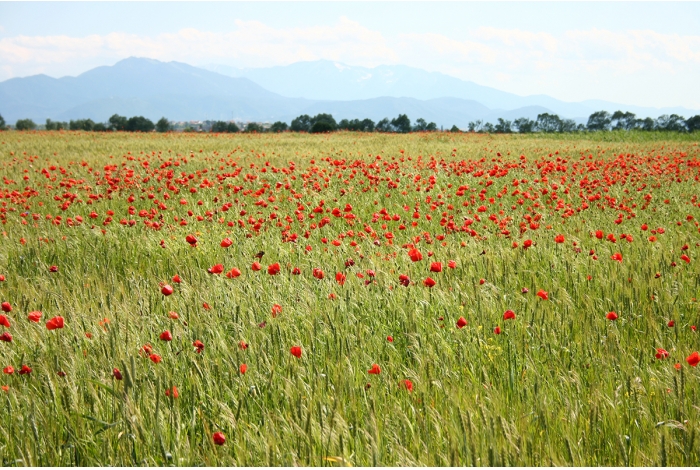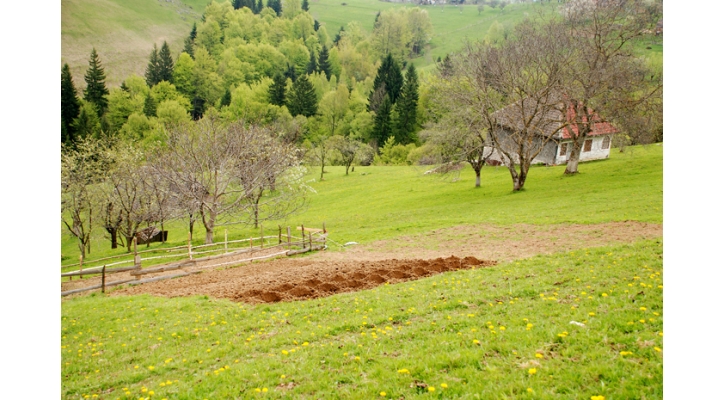Organic Takes The Lead
It's not all about technology. The rural communities from Romania should understand the importance of continuing to treat their land the same way it has been always done: organically.

Organic culture of wheat - photo taken by Ana A. Negru
I am nearing the end of a post-secondary education in the field of New Media or as often referred, Multimedia Studies. The most important lesson that I have acquired and held onto from my New Media education; is the underlying destructive effects of the mass media, as pertains to the constant and progressive rapid increase of technology and it’s powerful impact and influence on societies around the globe. Progressive technology is taking generations further and further away from the values and things that should be imperious priorities in life. We are losing the blessed appreciation for genuine human interactions, family traditions and socialization. We are losing the sacred value of Mother Nature and of our balance with the environment, of spiritual faith of simple means, and of harmony.
Though we are close to losing these essential life components, they do still exist - tucked away in the hearts of the often-overlooked rural communities around the globe. The reason that rural communities have endured and survived global societies life threatening escapade into mass production and globalization, is rural agriculture. Rural agriculture is the backbone of civilization and is immeasurable to city and country dwellers alike. Romania is vastly spread with rural agricultural communities. However as in most newly developed countries, they are struggling to maintain their rustic lifestyle in the impending faces of modernism and technology. I feel that it is perhaps the view of some that because Romania is newly developed and it lags behind the highly efficient and productive agriculture states of the rest of Europe, that in this era it will remain at a great economic disadvantage.
However, the once rich resources of the highly productive Western European nations are dwindling and over saturated. Not only Western Europe, many industrialized nations today are now facing the arising negative consequences (not just on resources and production levels, but in terms of health effects, rapidly fading bio-diversity, plant species, ecosystems, etc.) of their recent over productive and chemically induced agriculture methods. More over, they are looking for alternatives and people, now more consumer conscious than ever before, are turning to organic produce. The need for clean food, produced without staining the earth’s ecosystems, environments, or resources and without harming human health is imperious (Slow Food).Safe produce aside, the recognition to re-establish and protect the traditions and pleasures once found at the family table, from the ‘homogenization of modern fast food and fast life’ is becoming pertinent. This is a globally supported and expanded view gaining awareness by NGO’S with mantras such as: “To promote a sustainable model of agriculture that is respectful of differentiating environments, cultural identities and animal warfare. We need to support rural communities’ right to decide what they produce and what they eat, to encourage regional food traditions, the pleasures of the table, and a slower more harmonious rhythm of life.” As the tides of time are changing and removing the kitchen table from the picture, it is our challenge to remind the industrialized media-frantic nations t of the importance to save pleasant table manners, and the table itself, for our future generations.
In context, rural farming communities provide not only essential agrilife, but also substantial life qualities that teach appreciation and value. Children raised in these communities are subject to the vital life lessons that are real and tangible unlike any classroom or computer could ever produce (i.e. in the reward of; producing something naturally from the soil of the earth, physical hard work and endurance, lessons discovered in the gifts of animals and nature, sharing fresh air and fresh produce, and generating bio-diversity). Though it is not feasible to integrate the latter experiences into all urbanites abroad, it is crucial to preserve them never the less.
Romania is the agricultural underdog of Europe, but with optimism and united people it undoubtedly has the potential to take the lead in natural produce as the Western Production methods fall to the wayside. With the building up of Romania’s elite bio-technological agriculture, organic farming, traditional agriculture, and implementing quality foreign investment, rural areas may exceedingly rise.
Romania has a fighting chance at the brink of a new era. It can emerge from beneath it’s own past rural agricultural challenges, regenerate the precious rural agriculture communities, and allow them to maintain a simpler way of life.
The answers are undoubtedly in harnessing chemical free, natural, and healthy agriculture resources and methods. Essentially Romania stands apart as it presently has the unharnessed rural agriculture assets and vast resources to offer just that.
by Sky-Lee Jarrett





